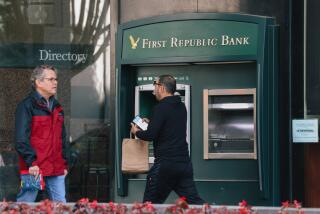Sub-prime solution: nationalize
- Share via
LONDON — The British government waded into the sub-prime quagmire Sunday with the announcement that it would move to nationalize Northern Rock, the nation’s fifth-largest mortgage lender.
The treasury department rejected two private rescue plans for the ailing bank because they failed to “deliver sufficient value for money for the taxpayer,” said the treasury chancellor, Alistair Darling.
The northern England bank, which wrote a fifth of all new home loans in Britain last year before it fell victim to cash shortfalls stemming from the U.S. sub-prime crisis, will be held under temporary public ownership until it can be stabilized and resold, government officials said.
Like most British banks, Northern Rock didn’t have a significant portion of its loan portfolio in the sub-prime market. The bank was nonetheless caught up in the turbulence because of its substantial reliance for funding on short-term money markets, which rapidly eroded as banks lost lending confidence.
“Under public ownership, the government will secure the entire proceeds from the future sale of the business in return for bearing the risks in this period of market uncertainty,” Darling said. “We could have chosen to pursue either of the two private sector options. But I have always said that I was determined to protect the taxpayers’ interest.”
The government has extended about $104.5 billion in loans and other guarantees to prop up the Newcastle-based bank and was reluctant to agree to any private sector bailout that didn’t guarantee taxpayers an early repayment with interest.
The request for government aid in September triggered Britain’s first bank run in more than a century and led to fears that more banks could be damaged by the global credit crunch.
The move to temporarily nationalize the bank could be a blow to Britain’s efforts to establish London as the global capital of finance and politically costly to Prime Minister Gordon Brown, who has staked his career on his stewardship of Britain’s economic boom.
Political opposition leaders accused the Labor Party government of spinning its wheels too long in reaching a decision, and Conservative Party leaders signaled they would oppose the nationalization legislation when it is presented to the House of Commons today.
“Gordon Brown has dithered his way to the disaster of nationalization. Now the taxpayer will bear the full risk of lending 100 billion pounds of mortgages in an uncertain housing market,” George Osborne, the Conservatives’ shadow chancellor, said in a statement.
“We will not back nationalization. We will not help Gordon Brown take this country back to the 1970s.”
The left-center Liberal Democrats said the nationalization decision was the correct one, if too late.
“The object of this, of course, is to get the taxpayers’ money back. It’s twice the size of the annual defense budget that’s at stake here,” the party’s treasury spokesman, Vince Cable, told the BBC.
Northern Rock shareholders, which include hedge funds and other large investors, have already expressed fears the nationalization will decimate their stakes, and they are expected to sue.
Darling appointed Ron Sandler, who led the rescue of insurer Lloyd’s of London when it was threatened with collapse in the mid-1990s, chairman of Northern Rock and said the bank would be run independently, with no government involvement in day-to-day operations.
The decision followed several months of attempts to pursue what Brown and Darling had said was the government’s preferred option of a private acquisition. But in the end the two private offers, one from the bank’s current management and another from a consortium led by Richard Branson’s Virgin Group, failed to deliver adequate guarantees for taxpayers, Darling said.
With the Virgin offer, he said, taxpayers would not have seen any share of the private sector’s return until the value of the business had reached at least $5.1 billion.
“A subsidy on the scale required would not in the government’s judgment provide best value for money for the taxpayer, in circumstances where the private sector rather than the taxpayer would secure the vast majority of the value created over the period ahead,” Darling said.
Branson said he believed Virgin’s offer was a good alternative for saving the bank and its jobs. “All of us in the Virgin consortium are very disappointed that the government has chosen to opt for nationalization,” the billionaire businessman said. “We were very clear the business plan we put forward was robust, conservative but ultimately capable of rescuing the interests of all stakeholders.”
Trading in Northern Rock shares will be suspended this morning as the emergency legislation is presented in Parliament, where it is expected to clear quickly, despite Conservative objections.
More to Read
Sign up for Essential California
The most important California stories and recommendations in your inbox every morning.
You may occasionally receive promotional content from the Los Angeles Times.









